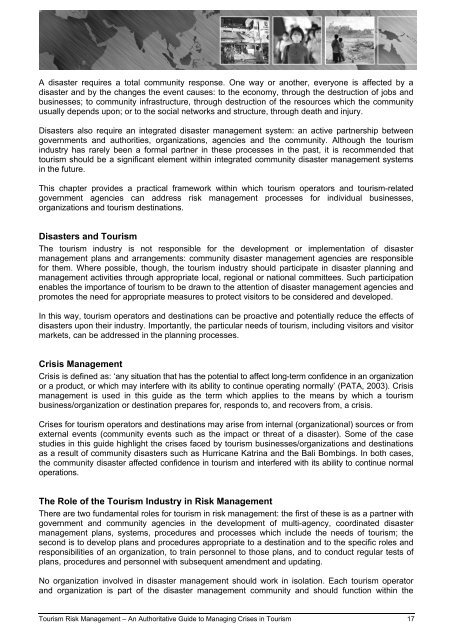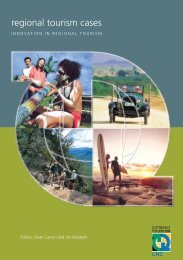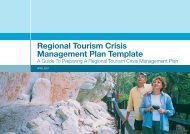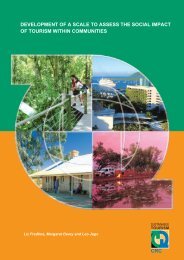Tourism Risk Management - Sustainable Tourism Online
Tourism Risk Management - Sustainable Tourism Online
Tourism Risk Management - Sustainable Tourism Online
Create successful ePaper yourself
Turn your PDF publications into a flip-book with our unique Google optimized e-Paper software.
A disaster requires a total community response. One way or another, everyone is affected by a<br />
disaster and by the changes the event causes: to the economy, through the destruction of jobs and<br />
businesses; to community infrastructure, through destruction of the resources which the community<br />
usually depends upon; or to the social networks and structure, through death and injury.<br />
Disasters also require an integrated disaster management system: an active partnership between<br />
governments and authorities, organizations, agencies and the community. Although the tourism<br />
industry has rarely been a formal partner in these processes in the past, it is recommended that<br />
tourism should be a significant element within integrated community disaster management systems<br />
in the future.<br />
This chapter provides a practical framework within which tourism operators and tourism-related<br />
government agencies can address risk management processes for individual businesses,<br />
organizations and tourism destinations.<br />
Disasters and <strong>Tourism</strong><br />
The tourism industry is not responsible for the development or implementation of disaster<br />
management plans and arrangements: community disaster management agencies are responsible<br />
for them. Where possible, though, the tourism industry should participate in disaster planning and<br />
management activities through appropriate local, regional or national committees. Such participation<br />
enables the importance of tourism to be drawn to the attention of disaster management agencies and<br />
promotes the need for appropriate measures to protect visitors to be considered and developed.<br />
In this way, tourism operators and destinations can be proactive and potentially reduce the effects of<br />
disasters upon their industry. Importantly, the particular needs of tourism, including visitors and visitor<br />
markets, can be addressed in the planning processes.<br />
Crisis <strong>Management</strong><br />
Crisis is defined as: ‘any situation that has the potential to affect long-term confidence in an organization<br />
or a product, or which may interfere with its ability to continue operating normally’ (PATA, 2003). Crisis<br />
management is used in this guide as the term which applies to the means by which a tourism<br />
business/organization or destination prepares for, responds to, and recovers from, a crisis.<br />
Crises for tourism operators and destinations may arise from internal (organizational) sources or from<br />
external events (community events such as the impact or threat of a disaster). Some of the case<br />
studies in this guide highlight the crises faced by tourism businesses/organizations and destinations<br />
as a result of community disasters such as Hurricane Katrina and the Bali Bombings. In both cases,<br />
the community disaster affected confidence in tourism and interfered with its ability to continue normal<br />
operations.<br />
The Role of the <strong>Tourism</strong> Industry in <strong>Risk</strong> <strong>Management</strong><br />
There are two fundamental roles for tourism in risk management: the first of these is as a partner with<br />
government and community agencies in the development of multi-agency, coordinated disaster<br />
management plans, systems, procedures and processes which include the needs of tourism; the<br />
second is to develop plans and procedures appropriate to a destination and to the specific roles and<br />
responsibilities of an organization, to train personnel to those plans, and to conduct regular tests of<br />
plans, procedures and personnel with subsequent amendment and updating.<br />
No organization involved in disaster management should work in isolation. Each tourism operator<br />
and organization is part of the disaster management community and should function within the<br />
<strong>Tourism</strong> <strong>Risk</strong> <strong>Management</strong> – An Authoritative Guide to Managing Crises in <strong>Tourism</strong> 17
















